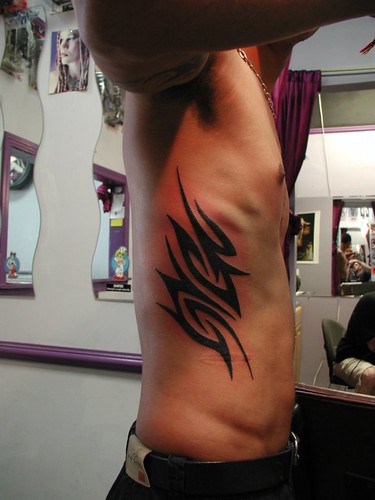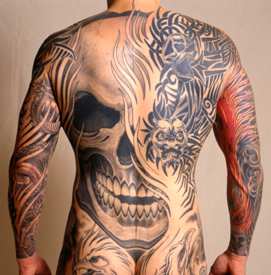 There is absolutely no way to gauge how painful a Body Tattoo is going to be - each and every one is different. It depends mainly on your state of mind, if you turn up at the Tattoo Studio in a positive frame of mind, looking forward to the experience, it probably won't hurt as much as you think. If you arrive nervous and unprepared - it will almost certainly hurt more than you expect. There are some practical and simple steps you can take to make sure that it isn't an unpleasant experience.
There is absolutely no way to gauge how painful a Body Tattoo is going to be - each and every one is different. It depends mainly on your state of mind, if you turn up at the Tattoo Studio in a positive frame of mind, looking forward to the experience, it probably won't hurt as much as you think. If you arrive nervous and unprepared - it will almost certainly hurt more than you expect. There are some practical and simple steps you can take to make sure that it isn't an unpleasant experience.Getting a Tattoo means the Artist has to pierce your skin. That will always involve pain. Irrespective of the size of the tattoo, or even or where it is positioned, you can expect to feel discomfort at the very least though body tattoos are generally less painful than other areas. We all have a different level of pain tolerance, women usually have a higher pain threshold than men, and that pain threshold will dictate how uncomfortable it is regardless of any other factors. The pain is more of a burning or tingling sensation rather than a prolonged discomfort like toothache. In areas which have less tissue, muscle or fat and which are bony, such as feet and wrists, the discomfort may rise to level of real pain. In fact some Tattoo Artists will not work on these areas for just that reason. Unless men have a particularly bony chest that isn't generally a problem. Backs, arms, legs and areas where there is plenty of muscle or a layer of fat will hardly have any discomfort at all.
Tattoo needles pierce the skin very quickly and at varying depths depending on which parts of the design are being inked. The first part of any Tattoo is the outline which generally has to be done at the deepest level to create the dark outline around the design which needs to stand out, so the needles are inserted deeply and carefully to make sure it looks right - there is no easy way to erase mistakes. If it is a particularly large Tattoo then it will have to be done in more than one session, the shading and contouring done after the outline. The shading isn't generally such an uncomfortable experience as the needles don't have to penetrate so deeply and the Artist can work more quickly when filling in a design.
There are some common sense guidelines that you should follow when going to get your Tattoo which will reduce the likelihood of extreme pain. First of all, choose your Tattoo Artist with care, look at examples of their work and talk to people in the studio when you make your first visit. This is when you start to develop the relationship with the Artist who is going to work on your body, don't be rushed and discuss the design at length until you are completely satisfied. No good Tattoo Artist will hurry this stage of the process. Secondly, when you arrive at the Studio for your Tattoo, be prepared for it to take time. No Artist likes to rush their work and you don't want them to make a mistake because you are watching the clock.
 Don't be tempted to have a drink to bolster your courage, or take drugs - even painkillers, before your Tattoo. To begin with it doesn't work particularly well, any drugs or alcohol will also thin your blood so you will bleed more which can impede healing and spoil a good tattoo. No reputable artist will work on you in that state, even if you have been in before to discuss your design. Most Tattoo Studios play music which helps you to relax but you can always take along your own choice to listen to if that helps you to relax and take your mind of what is going on around you. Just blocking out the sound is enough to help a lot of people deal with th discomfort. Taking a friend along who will chat with you is also a good idea. On a very practical note, make sure you are physically comfortable before work begins, if you are fidgeting your tattoo will not look good.
Don't be tempted to have a drink to bolster your courage, or take drugs - even painkillers, before your Tattoo. To begin with it doesn't work particularly well, any drugs or alcohol will also thin your blood so you will bleed more which can impede healing and spoil a good tattoo. No reputable artist will work on you in that state, even if you have been in before to discuss your design. Most Tattoo Studios play music which helps you to relax but you can always take along your own choice to listen to if that helps you to relax and take your mind of what is going on around you. Just blocking out the sound is enough to help a lot of people deal with th discomfort. Taking a friend along who will chat with you is also a good idea. On a very practical note, make sure you are physically comfortable before work begins, if you are fidgeting your tattoo will not look good.
Finally if it all gets too much and you need to take a break, say so - especially if it is a large tattoo. Your tattoo artist won't mind, they would rather you were comfortable as it makes their job easier. If you need to split it into more than one session , that won't be a problem for most Studios and the nature of a tattoo is such that it doesn't need to be finished all in one go. Body Tattoos are a permanent art form that you have chosen to express your personality - following a few practical steps will make sure it is a relatively pain free experience.

